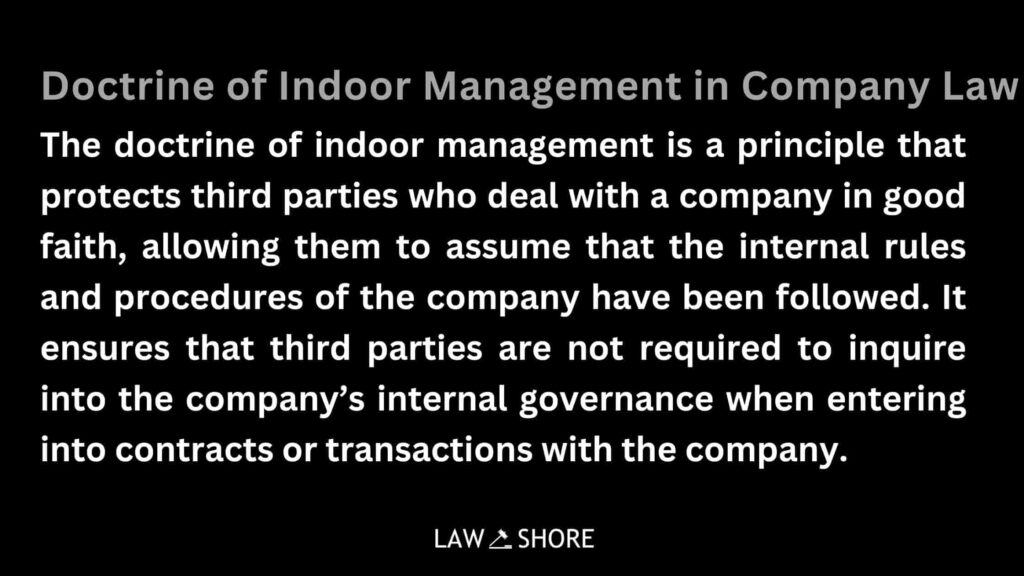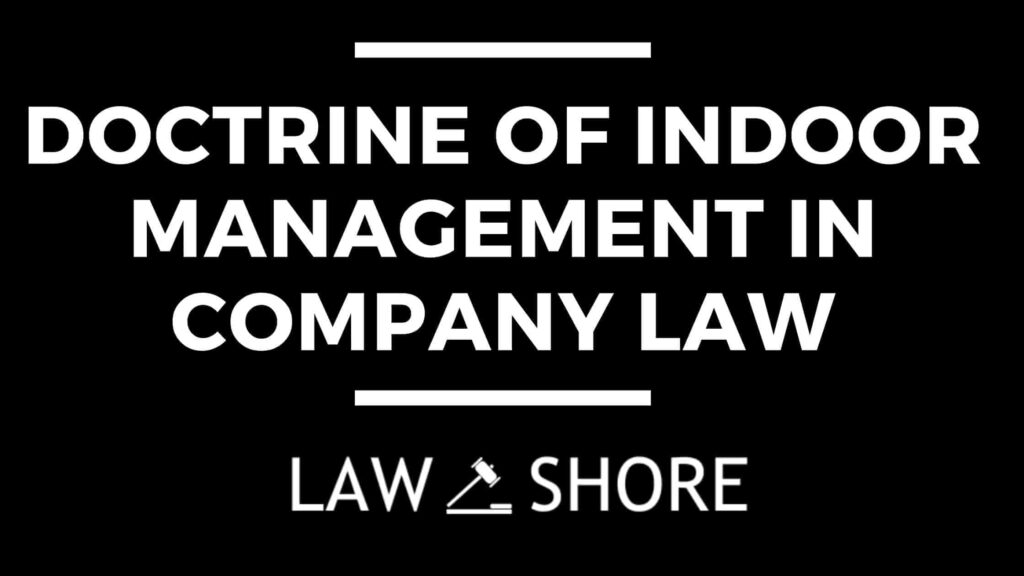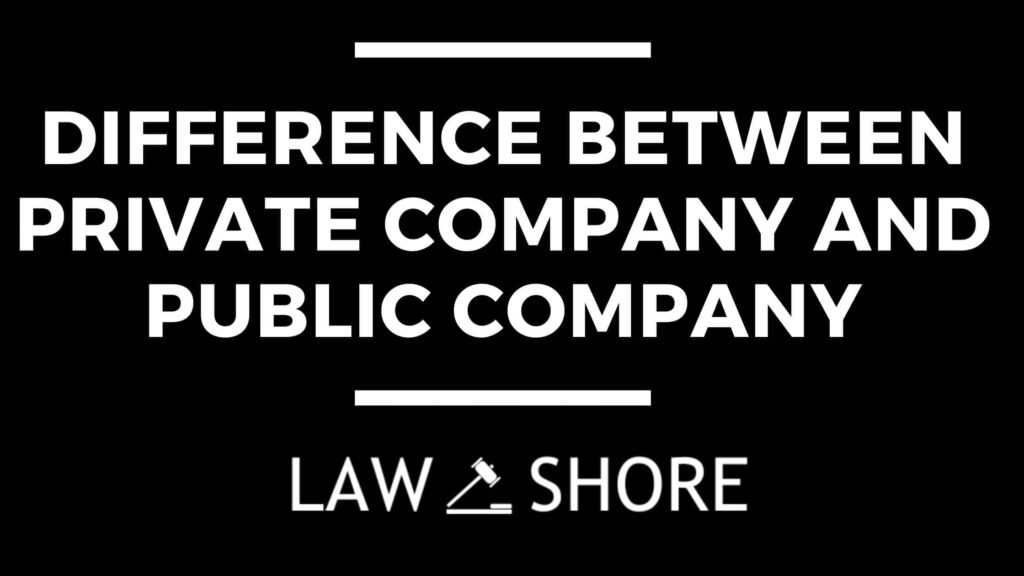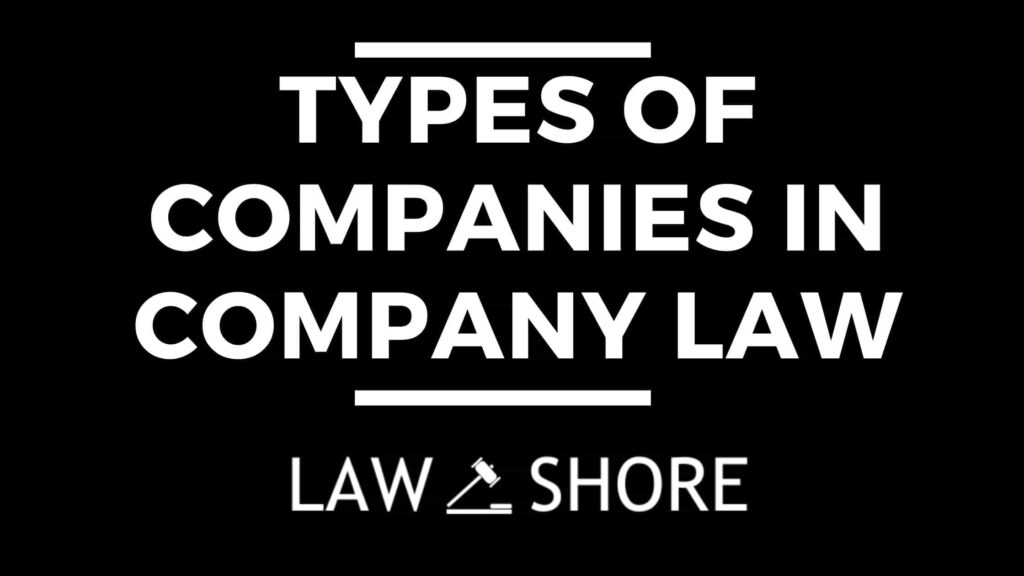Doctrine of Indoor Management
Table of Contents
ToggleThe doctrine of indoor management is an essential principle in company law, which protects third parties dealing with a company in good faith. The principle ensures that individuals interacting with a company need not concern themselves with the internal procedures or requirements of the company, provided they act reasonably. This article explores the concept of indoor management under Indian company law, as codified in the Companies Act, 2013, focusing on its features, relevant sections, and illustrative case laws.
What is the Doctrine of Indoor Management?

The doctrine of indoor management is a principle that protects third parties who deal with a company in good faith, allowing them to assume that the internal rules and procedures of the company have been followed. It ensures that third parties are not required to inquire into the company’s internal governance when entering into contracts or transactions with the company.
Origin of the Doctrine of Indoor Management
The Doctrine of Indoor Management originated from the Royal British Bank v. Turquand (1856) case, where the court ruled that third parties dealing with a company do not need to inquire into its internal processes (like board meetings or resolutions). In this case, the Royal British Bank had lent money to a company based on a loan agreement that seemed authorized by the company’s directors, even though proper internal formalities were not followed.
The court held that third parties, acting in good faith, are entitled to assume that internal procedures were correctly followed unless they have actual knowledge of the irregularity. This principle, known as the Turquand Rule, became the foundation of the doctrine of indoor management in company law.
Legal Framework of Indoor Management under the Companies Act, 2013
Although the Companies Act, 2013 does not expressly mention “indoor management,” various provisions align with the principles underlying this doctrine, particularly with respect to the powers and authority of the company and its officers:
Section 18: Powers of the Company to Contract
- Explanation: This section outlines the company’s ability to enter into contracts and form agreements. It assumes that external parties can rely on the fact that the company’s officers have authority to execute such agreements unless they have specific knowledge of any restriction or irregularity in the company’s powers.
- Link to Indoor Management: Third parties dealing with the company can assume that the company’s officers are properly authorized to enter into contracts or transactions, as long as they do not have actual knowledge of any restriction or irregularity.
Section 19: Binding Nature of the Acts of the Company
- Explanation: This section ensures that the acts of the company’s officers, directors, and other authorized persons are binding on the company, provided those acts fall within the scope of their authority as defined in the company’s memorandum of association or articles of association.
- Link to Indoor Management: Third parties can rely on the fact that any action taken by the company’s officers within their apparent authority will bind the company, assuming they have acted in good faith and without knowledge of any internal irregularity.
Section 20: Authority of Officers to Bind the Company
- Explanation: Section 20 clarifies that the company’s officers, directors, and agents can bind the company in transactions with third parties, provided they act within their apparent authority.
- Link to Indoor Management: This provision underpins the doctrine by protecting third parties who assume that the company’s internal procedures have been followed, allowing them to rely on the actions of officers and directors within their apparent authority.
Section 21: Alteration of Memorandum and Articles of Association
- Explanation: This section specifies the procedures for altering the company’s memorandum and articles of association.
- Link to Indoor Management: It reinforces that third parties may rely on the company’s constitutional documents (i.e., memorandum and articles) as valid and enforceable unless they have actual knowledge of any amendments that may affect the company’s powers or the authority of its officers.
Features of the Doctrine of Indoor Management
The doctrine of indoor management is founded on fairness, protecting the interests of third parties dealing with a company. Some key features of this doctrine include:
- Presumption of Regularity: Third parties dealing with a company are presumed to have their dealings in compliance with the company’s internal procedures, such as board resolutions, shareholder approvals, etc.
- Protection for Third Parties: The doctrine protects third parties dealing in good faith, allowing them to assume that the company’s internal affairs are properly conducted, without needing to verify compliance with internal rules.
- Exempt from Internal Investigation: Third parties are not required to investigate or inquire into the company’s internal governance mechanisms, such as checking board minutes or the articles of association.
- Application to Company’s Officers: It applies to actions of the company’s officers (e.g., directors, managers) who act within their apparent authority as prescribed by the company’s internal documents.
- Assumption of Proper Authorization: Third parties are entitled to assume that the company’s officers have the necessary authority to act on its behalf, unless they have actual knowledge to the contrary.
- Limited to Good Faith Transactions: Protection is granted only if the third party deals with the company in good faith, without knowledge of internal irregularities.
- Not Applicable to Fraud or Bad Faith: The doctrine does not apply when the transaction involves fraud, bad faith, or dishonest conduct on the part of either the third party or the company’s officers.
- Excludes Ultra Vires Acts: The doctrine does not protect transactions that are beyond the company’s legal powers (ultra vires), as outlined in the company’s memorandum of association.
- Forged Documents Are Excluded: If documents relied upon by the third party (such as a board resolution or signature) are forged, the doctrine of indoor management does not apply.
- Based on Judicial Precedent: The doctrine stems from common law principles, especially the Turquand Rule from the case Royal British Bank v. Turquand (1856), which established the presumption that third parties need not inquire into the company’s internal processes.
Exceptions to the Doctrine of Indoor Management in Company Law
The doctrine of indoor management is a fundamental principle in company law, ensuring that third parties dealing with a company in good faith can assume that the company’s internal procedures have been complied with, even if they haven’t been. However, this doctrine does not offer blanket protection in all situations. There are certain exceptions where the doctrine of indoor management does not apply, particularly when the third party has knowledge of internal irregularities or when the company’s actions go beyond its legal powers.
Below are the key exceptions to the doctrine of indoor management, with relevant case laws and illustrations:
Knowledge of Irregularities (Actual Knowledge)
The most important exception to the doctrine of indoor management arises when the third party dealing with the company has actual knowledge of the internal irregularity, fraud, or failure to comply with internal procedures.
- Explanation:
If the third party is aware that the company has not followed its internal procedures—such as board resolutions or shareholder approvals—then they cannot rely on the presumption that the company’s internal governance has been properly followed. In such cases, the third party cannot invoke the indoor management doctrine. - Case Law:
Cox v. Sun Alliance & London Insurance (1984):
In this case, the House of Lords ruled that a person dealing with a company in good faith cannot rely on the doctrine of indoor management if they know or suspect that internal procedures have not been followed. The court held that the claimant was not entitled to the protection of the doctrine because they had knowledge of the irregularities.
Howard v. Patent Ivory Manufacturing Co. Ltd. (1888):
In this case, the court ruled that a person dealing with the company could not rely on the presumption that the internal processes were followed when they had actual knowledge of the company’s internal proceedings and knew that the necessary internal approvals were missing. - Illustration:
If a director of a company is authorized to sign a contract, and the company’s board has not approved this action, a third party dealing with the company will not be protected under the doctrine of indoor management if they know that the board’s approval was not obtained. The doctrine would not apply because the third party had actual knowledge of the irregularity.
Ultra Vires Acts (Acts Beyond the Powers of the Company)
The doctrine of indoor management does not protect third parties if the company has acted beyond its powers (i.e., ultra vires). If a company enters into a transaction that is beyond the scope of its objects as defined in its memorandum of association, then the doctrine does not apply to protect the third party.
- Explanation:
An ultra vires act refers to any act or transaction that is outside the company’s legal capacity or powers, as defined by its memorandum or the applicable laws. The doctrine of indoor management will not apply in situations where a third party is dealing with the company in a transaction that is outside the company’s scope of authority. - Case Law:
Ashbury Railway Carriage and Iron Co. v. Riche (1875):
This case is a landmark in understanding ultra vires acts. The court held that a company cannot bind itself to a transaction that goes beyond the powers stipulated in its memorandum of association. The rule of indoor management does not apply in cases of ultra vires transactions.
Venkateshwaran v. D. R. Bhuwania (2016) (Indian Case):
In this case, the Supreme Court of India emphasized that a third party cannot rely on the doctrine of indoor management if the act of the company is ultra vires (beyond the scope of the company’s powers). The third party is not protected if the company’s actions exceed its legally defined powers. - Illustration:
A company with the objects of manufacturing electronics cannot, under normal circumstances, enter into a contract for real estate development, as this would be beyond the scope of its registered objects. If a third party is aware of the company’s objects and still enters into such an agreement, they cannot claim protection under the doctrine of indoor management.
Fraud or Bad Faith
The doctrine of indoor management does not apply when the transaction involves fraud or when the third party is acting in bad faith. If a transaction is conducted in a manner intended to defraud or deceive, or if the third party is aware that the transaction is dishonest or fraudulent, they cannot rely on the doctrine.
- Explanation:
Fraud and bad faith involve deceitful conduct or the intention to mislead another party. In such cases, the third party cannot benefit from the indoor management doctrine because the entire basis of the protection is grounded in fairness, which is absent when fraud or bad faith is involved. - Case Law:
Kumari v. Satyam Computer Services Ltd. (2008):
In this case, the company’s directors were found to have acted in bad faith, and the court held that the doctrine of indoor management would not apply. The claimant (third party) could not claim protection because the transaction was tainted with fraud, as the directors were intentionally misleading.
Société Générale de Belgique v. Velayatli (1915):
This case involves the application of the doctrine of indoor management when the transaction was found to be fraudulent. The court ruled that the third party could not rely on the doctrine if they were involved in or had knowledge of the fraud. - Illustration:
If a third party enters into a contract with a company based on forged documents (e.g., fake board resolutions), they cannot rely on the indoor management doctrine to claim that the company’s internal procedures were followed. Since the transaction involves fraud, the protection under the doctrine is unavailable.
Forged Documents
The indoor management doctrine does not protect third parties in cases where documents relied upon by the third party are forged or fraudulent. A third party dealing with the company may assume the company’s internal documents are valid, but if those documents are forged or false, the protection will not apply.
- Explanation:
If a document, such as a resolution, signature, or authorization, is forged, the third party cannot rely on the assumption that the internal process has been followed. The protection is lost because the company did not actually comply with its internal procedures. - Case Law:
K. R. Sreedharan v. Union of India (2008):
In this case, the court ruled that if a third party relies on forged documents (such as a forged resolution), they cannot invoke the doctrine of indoor management. The principle of good faith cannot protect them when they are dealing with falsified documents.
Mahesan v. Chidambaram (1969):
The court held that when documents are forged, the third party cannot benefit from the indoor management doctrine. The protection is denied as the company did not act through valid authority. - Illustration:
If a director signs a contract with a third party using a forged board resolution, the third party cannot claim protection under the doctrine of indoor management, as the document (board resolution) was forged.
Irregularity in Compliance with Constitutional Documents (Articles or Memorandum)
The doctrine of indoor management does not protect third parties when the company’s internal constitutional documents (such as its articles of association or memorandum of association) have not been properly adhered to. If the company is acting in violation of its own constitutional framework, the protection under the indoor management doctrine does not extend to the third party.
- Explanation:
If internal actions or procedures, as outlined in the company’s articles or memorandum, are violated, and the third party knows or should know of the violation, they cannot assume that the company’s internal governance was in order. The protection is lost when the company’s own rules are breached. - Case Law:
Howard v. Patent Ivory Manufacturing Co. Ltd. (1888):
In this case, the company’s internal rules were violated, and the court held that the third party could not rely on the doctrine of indoor management because they were aware of the irregularity in the company’s internal compliance. - Illustration:
A company’s articles of association may require a special resolution to authorize a particular transaction. If the transaction is undertaken without such a resolution, a third party cannot rely on the indoor management doctrine to claim that the company’s internal procedures were followed, unless they were unaware of the irregularity.
What is the Role of the Board of Directors in the Context of Indoor Management?
The board of directors has the authority to manage the company’s affairs and enter into contracts on behalf of the company. Third parties dealing with the company are protected under the doctrine of indoor management, provided they act in good faith and do not have knowledge of the board’s failure to follow internal procedures or act beyond its authority.
Relevant Case Laws Illustrating the Scope of Indoor Management
Several landmark cases have played a crucial role in shaping and clarifying the scope of the Doctrine of Indoor Management. Below is a detailed explanation of key case laws that have illustrated and developed the doctrine:
Royal British Bank v. Turquand (1856)
Court: House of Lords (United Kingdom)
Facts:
The Royal British Bank loaned money to a company based on a loan agreement that seemed authorized by the company’s directors. However, the company had not passed the required board resolution to authorize the borrowing.
The bank sought to enforce the loan agreement, while the company argued that it was not bound because the proper internal procedure (a board resolution) was not followed.
Key Findings and Judgment:
- The House of Lords ruled that third parties dealing with a company in good faith are entitled to assume that the company has complied with all its internal governance procedures (e.g., board approvals and resolutions), even if those procedures have not actually been followed.
- The court established the Turquand Rule, which allows third parties to assume that internal formalities, such as board resolutions, have been complied with unless they have actual knowledge of the irregularity.
- This decision created the foundation for the Doctrine of Indoor Management, protecting third parties from the necessity of inquiring into the company’s internal procedures.
Court’s Ruling: The court held that the bank was entitled to rely on the assumption that the company had complied with its internal procedures, and the loan agreement was enforceable.
Bolton Partners v. Lambert (1889)
Court: Court of Appeal (United Kingdom)
Facts:
- The case involved a contract between a company and Bolton Partners, where the company’s director acted beyond the scope of his authority. The contract was not properly authorized by the company’s board.
- Bolton Partners claimed that the company was bound by the contract, and the company argued that the director did not have the authority to enter into the agreement.
Key Findings and Judgment:
- The Court of Appeal reaffirmed the Turquand Rule and held that third parties are entitled to assume that the company’s internal governance procedures (e.g., approval by directors or shareholders) have been followed, and they are not required to investigate the company’s internal affairs.
- The court ruled that the company was bound by the contract because the third party (Bolton Partners) had acted in good faith and had no knowledge that the internal procedures were not complied with.
Court’s Ruling: The court upheld the principle that a third party dealing with a company does not need to investigate whether the company’s internal rules were followed, unless they are aware of an irregularity. Bolton Partners succeeded in enforcing the contract.
Venkateshwaran v. D. R. Bhuwania (2016)
Court: Supreme Court of India
Facts:
- The case involved a dispute where Venkateshwaran, an investor, had entered into an agreement with a company, relying on the company’s official documents. However, it was later discovered that the company’s board resolution had not been passed to authorize the transaction.
- Venkateshwaran argued that the company was bound by the agreement, while the company contended that it was not bound due to the lack of internal approval.
Key Findings and Judgment:
- The Supreme Court of India reaffirmed the Doctrine of Indoor Management, stating that third parties dealing with a company in good faith are protected by the doctrine, even if the company has failed to follow its internal procedures.
- The court emphasized that the third party does not have to verify whether the company has complied with its internal governance procedures, such as obtaining board approvals or passing resolutions. The third party will only be denied protection under the doctrine if they have actual knowledge of the irregularity.
- The court distinguished that the doctrine does not apply to cases involving fraud or when the third party has knowledge of a lack of authority.
Court’s Ruling: The Supreme Court ruled in favor of Venkateshwaran, holding that he was entitled to rely on the company’s apparent authority and could enforce the agreement, as he acted in good faith and was unaware of any internal irregularities.
Phantom Films v. Sushant Singh Rajput (2020)
Court: Bombay High Court (India)
Facts:
- Phantom Films, a production company, had entered into a contract with Bollywood actor Sushant Singh Rajput. The company claimed that the contract had been authorized by the appropriate internal procedures, but later it was found that certain internal approvals (like board resolutions) were missing.
- Sushant Singh Rajput filed a suit against the company, questioning the validity of the contract based on the lack of internal approvals.
Key Findings and Judgment:
- The Bombay High Court upheld the Doctrine of Indoor Management, stating that third parties, including Sushant Singh Rajput, dealing with a company are entitled to assume that the company’s internal procedures (like obtaining necessary board resolutions or shareholder approvals) have been properly followed, unless they are aware of any irregularity.
- The court clarified that third parties are not required to investigate the company’s internal affairs. It emphasized that the protection of the doctrine applies unless there is actual knowledge of any irregularity, fraud, or ultra vires act.
- The court also reiterated that the company must ensure compliance with internal procedures to avoid disputes, but the third party, acting in good faith, can still rely on the apparent authority of the company’s representatives.
Court’s Ruling: The court ruled in favor of Sushant Singh Rajput, allowing him to enforce the contract, as he had acted in good faith and had no knowledge of the lack of internal formalities within the company.
Key Takeaways from the Case Laws:
- Protection for Third Parties: All the cases reaffirm the principle that third parties dealing with a company in good faith are protected under the doctrine of indoor management, even if internal procedures (such as board resolutions or approvals) have not been complied with, as long as they are unaware of such irregularities.
- Presumption of Regularity: These cases emphasize that third parties do not have to investigate a company’s internal affairs or verify whether the company has followed its internal processes (e.g., board resolutions, shareholder meetings), as long as they are acting in good faith.
- Exceptions to the Doctrine: The cases also highlight the exceptions to the doctrine, such as cases of actual knowledge of internal irregularities, fraud, or ultra vires acts. If the third party knows of any such irregularities, they cannot claim the benefit of the indoor management doctrine.
- Corporate Responsibility: Companies must ensure that internal governance procedures are properly followed, as failure to do so can expose them to legal challenges, even if third parties can claim protection under the indoor management doctrine.
Difference Between the Doctrine of Indoor Management and the Doctrine of Constructive Notice
- The Doctrine of Indoor Management provides protection to third parties who deal with a company, assuming the company has followed its internal governance processes, unless the third party has actual knowledge to the contrary.
- The Doctrine of Constructive Notice, on the other hand, places the burden on third parties to be aware of the company’s public documents and restricts their ability to claim ignorance of those documents’ contents.
Here’s a tabular comparison of the Doctrine of Indoor Management and the Doctrine of Constructive Notice:
Aspect | Doctrine of Indoor Management | Doctrine of Constructive Notice |
|---|---|---|
Definition | Protects third parties dealing with a company by assuming that the company’s internal procedures have been followed. | Assumes that third parties dealing with a company are deemed to know the contents of the company’s public documents (e.g., Memorandum and Articles of Association). |
Origin | Derived from the Turquand Rule (Royal British Bank v. Turquand, 1856). | A common law principle based on the idea that public documents are accessible to all and deemed to be known. |
Focus | Internal company procedures and their regularity. | Knowledge of the company’s public documents and powers. |
Application | Third parties are not required to inquire into the company’s internal management (e.g., board resolutions, shareholder approvals). | Third parties are deemed to know the contents of the company’s constitution (e.g., Memorandum of Association and Articles of Association). |
Protection for Third Parties | Provides protection to third parties assuming internal formalities were followed, unless they have actual knowledge of irregularities. | Third parties are assumed to know the company’s constitutional documents and cannot claim ignorance of restrictions stated within them. |
Scope of Application | Only applies to third parties dealing with the company in good faith, without knowledge of irregularities. | Applies to all third parties dealing with the company, regardless of their knowledge of internal affairs. |
Exceptions | Does not apply in cases of fraud, bad faith, ultra vires acts, or when third parties have knowledge of irregularities. | Does not apply if a third party proves they did not have access to the company’s public documents or if the contents were concealed. |
Example of Application | A third party enters into a contract with a company, assuming that internal formalities (e.g., board approval) have been complied with. | A third party deals with a company without checking the company’s constitutional documents, and later finds that the company’s powers were limited by those documents. |
Key Case | Royal British Bank v. Turquand (1856) – Introduced the indoor management rule. | Foss v. Harbottle (1843) – Established that shareholders and outsiders are deemed to know the company’s constitution. |
Impact on Third Parties | Protects third parties from the need to investigate internal procedures, assuming the company’s authority is valid. | Places the burden on third parties to inquire into the company’s internal rules and constitution to ensure the company is acting within its powers. |
These two doctrines balance the rights of third parties and companies, but they operate in fundamentally different ways, with indoor management offering more protection to third parties in terms of not requiring detailed internal inquiries, while constructive notice emphasizes the third party’s responsibility to verify the company’s powers through public documents.
Corporate Governance and Practical Implications
The doctrine of indoor management under the Companies Act, 2013 plays a critical role in maintaining the balance between the interests of companies and third parties. It ensures that external parties dealing with a company do not need to concern themselves with the company’s internal governance, so long as they act in good faith and without knowledge of any irregularities.
Through sections like 18, 19, and 20, the Act provides a framework for understanding how internal corporate actions impact third parties. The principles established in case laws, particularly in the cases of Royal British Bank v. Turquand and Venkateshwaran v. D. R. Bhuwania, have been instrumental in shaping the doctrine’s application in India.
While the doctrine of indoor management offers protection to third parties, its application is not without exceptions. Third parties must act in good faith and cannot rely on the doctrine if they are aware of the company’s internal irregularities or if the transaction is ultra vires.
Conclusion
The doctrine of indoor management under the Companies Act, 2013 plays a critical role in maintaining the balance between the interests of companies and third parties. It ensures that external parties dealing with a company do not need to concern themselves with the company’s internal governance, so long as they act in good faith and without knowledge of
any irregularities.
Through sections like 18, 19, and 20, the Act provides a framework for understanding how internal corporate actions impact third parties. The principles established in case laws, particularly in the cases of Royal British Bank v. Turquand and Venkateshwaran v. D. R. Bhuwania, have been instrumental in shaping the doctrine’s application in India.
While the doctrine of indoor management offers protection to third parties, its application is not without exceptions. Third parties must act in good faith and cannot rely on the doctrine if they are aware of the company’s internal irregularities or if the transaction is ultra vires.
Explore Law Shore: law notes today and take the first step toward mastering the fundamentals of law with ease.

After Completing my LLB hons, I started writing content about legal concepts and case laws while practicing. I finally started Law Shore in 2024 with an aim to help other students and lawyers.



